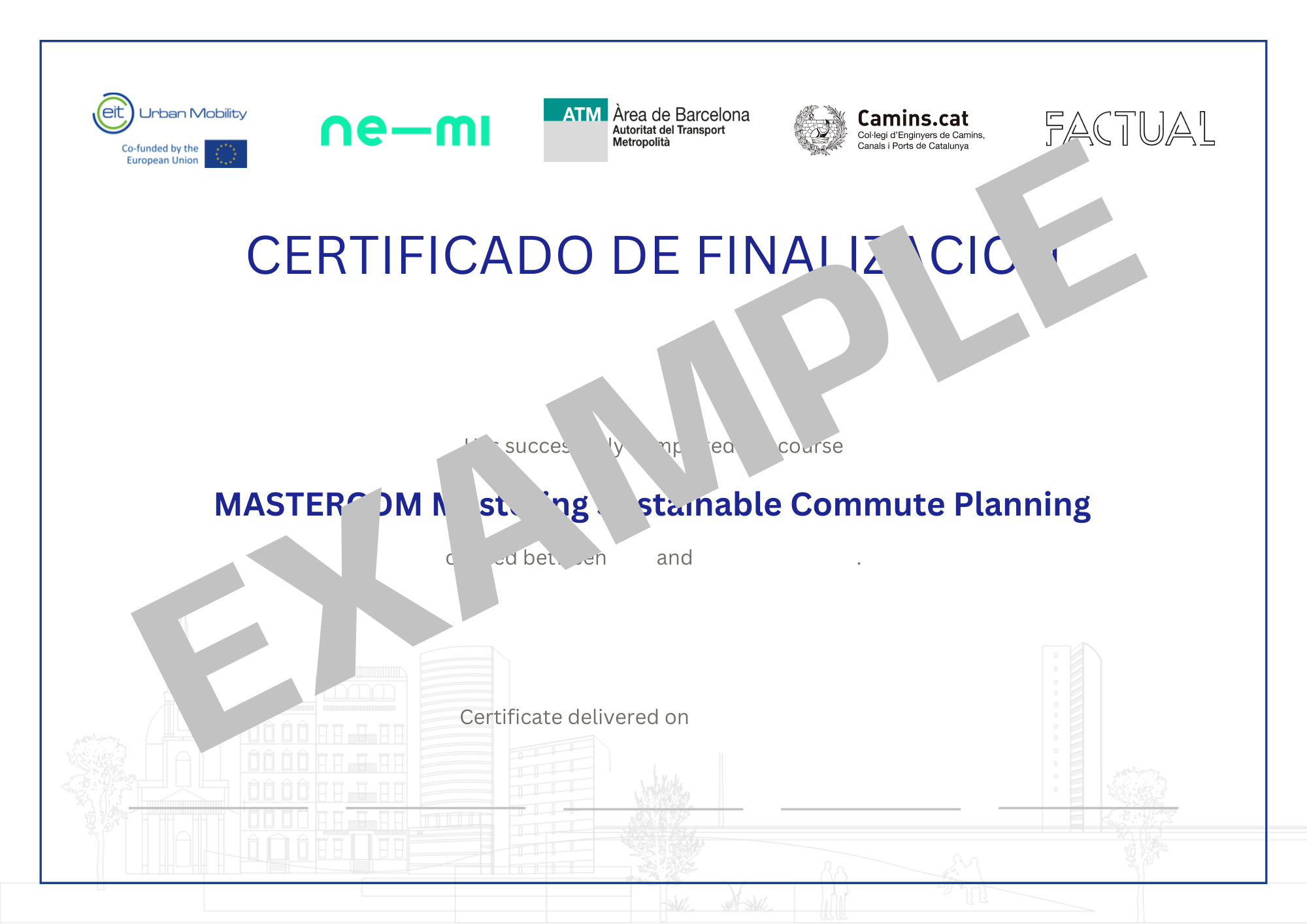14 de octubre al 15 de noviembre
AIM4Mobility: Fundamental Trends of AI and ML in Urban Mobility


AI and ML are no longer future technologies—they’re actively reshaping how we move through our cities.
Write your awesome label here.
PARTICIPANTS PROFILE
MASTERCOM addresses all professionals of public and private companies, who feel committed to sustainability and are motivated to transform the commuting patterns at their companies.
Training Format
Self-paced course.
Duration
8 hours (considering theoretical and practical tasks)
Language
English
Certificate of completion
Upon course compeltion, each participant will recieve a diploma from the EIT Urban Mobility.
Who is AIM4Mobility addressed to?



FORMAT OF THE COURSE
What will the participants get from the course
Understand
the key AI and ML concepts relevant to urban mobility.
Assess
the ethical, regulatory, and technical limitations of AI in urban mobility.
Analyze
the challenges and opportunities of implementing AI/ML solutions in mobility.
Explore
real-world use cases such as demand forecasting, route optimization, and traffic analysis
Write your awesome label here.
MASTERCOM has busy professionals in mind!
A central component of the trainingis a four-module, self-pacedonline course.
Write your awesome label here.
Knowledge exchange is key!
Regular live sessions with experts and educators create a personal and pleasant space for questions and direct exchange.
Write your awesome label here.
Focussing REAL-LIFE success stories!
The final event in February 2024 in Barcelona will bring together leading experts from academia and industry, sharing real case success stories.
MODULES
THE CURRENT LANDSCAPE OF URBAN MOBILITYIntroduction
This module introduces the foundational themes shaping today’s urban mobility. You'll explore how congestion, environmental sustainability, and spatial limitations influence modern transport systems.
The course delves into the European Union’s climate goals—particularly the European Green Deal and the European Climate Law—highlighting the transportation sector's role in greenhouse gas emissions and decarbonization challenges. You'll also examine transformative technologies such as IoT, big data, 5G, and cloud computing.
The module concludes with a recap and a preview of what’s ahead.
The course delves into the European Union’s climate goals—particularly the European Green Deal and the European Climate Law—highlighting the transportation sector's role in greenhouse gas emissions and decarbonization challenges. You'll also examine transformative technologies such as IoT, big data, 5G, and cloud computing.
The module concludes with a recap and a preview of what’s ahead.
FUNDAMENTALS OF URBAN MOBILITYModule 1
In this module, you'll explore the essential principles and strategies that shape modern urban mobility systems. Topics include Sustainable Urban Mobility Plans (SUMP), the impacts of urban sprawl, and how densification and infill strategies can enhance sustainability.
You'll learn about the importance of active and small-scale transport modes like walking and cycling, with a focus on first and last mile connectivity.
The module also introduces digital innovations such as Mobility as a Service (MaaS), Urban Digital Twins, and Smart Cities, examining their role in creating more integrated and data-driven transport systems. Additionally, you'll be introduced to key performance indicators for evaluating mobility systems, including the SUMI KPI framework, and explore critical data sources such as mobile networks, app data, and transport datasets.
The module concludes with a summary and a look ahead to the next topic.
You'll learn about the importance of active and small-scale transport modes like walking and cycling, with a focus on first and last mile connectivity.
The module also introduces digital innovations such as Mobility as a Service (MaaS), Urban Digital Twins, and Smart Cities, examining their role in creating more integrated and data-driven transport systems. Additionally, you'll be introduced to key performance indicators for evaluating mobility systems, including the SUMI KPI framework, and explore critical data sources such as mobile networks, app data, and transport datasets.
The module concludes with a summary and a look ahead to the next topic.
AI and ML USE CASE IN URBAN MOBILITYModule 2
This module explores how AI and ML are transforming urban mobility.
Topics include demand forecasting for shared mobility, predictive maintenance in public transport, smart traffic systems, urban freight optimization, connected autonomous vehicles (CAVs), cycling safety, urban digital twins, and urban air mobility.
Real-world examples from European projects will demonstrate how these technologies improve efficiency, sustainability, and safety in urban environments. The module concludes with a recap and introduction to upcoming topics.
Topics include demand forecasting for shared mobility, predictive maintenance in public transport, smart traffic systems, urban freight optimization, connected autonomous vehicles (CAVs), cycling safety, urban digital twins, and urban air mobility.
Real-world examples from European projects will demonstrate how these technologies improve efficiency, sustainability, and safety in urban environments. The module concludes with a recap and introduction to upcoming topics.
CHALLENGES, ISSUES AND IMPACTS OF AI INTEGRATION IN URBAN MOBILITYModule 3
This module introduces the technical, ethical, and regulatory challenges of integrating AI into urban mobility.Topics include data quality, cybersecurity risks, deployment costs, and computational demands, as well as the regulatory implications like data protection, liability in autonomous vehicle incidents, and privacy concerns.
The module also explores ethical issues such as algorithmic bias, unequal access, job displacement, and environmental impacts. The session concludes with a recap and a final assessment.
The module also explores ethical issues such as algorithmic bias, unequal access, job displacement, and environmental impacts. The session concludes with a recap and a final assessment.
In collaboration with:
CERTIFICATE OF COMPLETION
This project is supported by EIT Urban Mobility, an initiative of the European Institute of Innovation and Technology (EIT), a body of the European Union. EIT Urban Mobility acts to accelerate positive change on mobility to make urban spaces more liveable. Learn more: eiturbanmobility.eu




